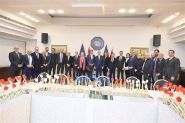None of the key Lebanese political figures can confirm US President Senior Advisor Amos Hochstein’s agenda during his upcoming visit to Lebanon. However, according to American sources, Hochstein’s expected visit to Lebanon (on Monday) could not be barren of some new information or developments. The question remains: what is the nature of this visit, and what developments could be put forward by Hochstein?
Lebanese government sources have disclosed that when Caretaker Prime Minister Najib Mikati met with Hochstein in Munich on February 16th, the draft being prepared by the United States regarding the implementation of United Nations Security Council Resolution 1701 wasn’t yet finalized. Hochstein informed Mikati that once this draft was ready, he would deliver it to Lebanon. Consequently, Lebanese government sources believe that the reason for Hochstein’s visit pertains to presenting this draft to Lebanese officials.
According to US sources, Hochstein's visit to Lebanon comes amidst ongoing negotiations regarding the Gaza ceasefire. Consequently, he is trying — should these negotiations succeed — to extend the ceasefire to southern Lebanon. Recent developments, particularly from the Israeli side, are currently linking the cessation of hostilities to Hezbollah's withdrawal from the border area and the redeployment of the Lebanese Army and UNIFIL with increased numbers and effectiveness. Consequently, necessary steps are required from the Lebanese side to ensure a guaranteed ceasefire and to prevent the escalation of the war onto Lebanese territory, especially given the ongoing preparations by the Israeli military in this regard.
On the other hand, Lebanese sources with connections to Hezbollah stated that the party's position remains unchanged. They affirm that the pro-Iranian party refuses to engage in any written or verbal discussions regarding the southern situation until the conclusion of the conflict in Gaza or the attainment of a permanent ceasefire.
These sources underline Hezbollah's rejection of any suggestion pertaining to the withdrawal of its members, along with their heavy weaponry, from the border region. According to Hezbollah, these armed members are residents of those villages and will be unwilling to leave. Moreover, they stress that any proposal, be it American or otherwise, warrants a thorough examination to evaluate its impact on Hezbollah's interests, security, and military capabilities.
Lebanese government sources have disclosed that when Caretaker Prime Minister Najib Mikati met with Hochstein in Munich on February 16th, the draft being prepared by the United States regarding the implementation of United Nations Security Council Resolution 1701 wasn’t yet finalized. Hochstein informed Mikati that once this draft was ready, he would deliver it to Lebanon. Consequently, Lebanese government sources believe that the reason for Hochstein’s visit pertains to presenting this draft to Lebanese officials.
According to US sources, Hochstein's visit to Lebanon comes amidst ongoing negotiations regarding the Gaza ceasefire. Consequently, he is trying — should these negotiations succeed — to extend the ceasefire to southern Lebanon. Recent developments, particularly from the Israeli side, are currently linking the cessation of hostilities to Hezbollah's withdrawal from the border area and the redeployment of the Lebanese Army and UNIFIL with increased numbers and effectiveness. Consequently, necessary steps are required from the Lebanese side to ensure a guaranteed ceasefire and to prevent the escalation of the war onto Lebanese territory, especially given the ongoing preparations by the Israeli military in this regard.
On the other hand, Lebanese sources with connections to Hezbollah stated that the party's position remains unchanged. They affirm that the pro-Iranian party refuses to engage in any written or verbal discussions regarding the southern situation until the conclusion of the conflict in Gaza or the attainment of a permanent ceasefire.
These sources underline Hezbollah's rejection of any suggestion pertaining to the withdrawal of its members, along with their heavy weaponry, from the border region. According to Hezbollah, these armed members are residents of those villages and will be unwilling to leave. Moreover, they stress that any proposal, be it American or otherwise, warrants a thorough examination to evaluate its impact on Hezbollah's interests, security, and military capabilities.
Lire aussi



Commentaires